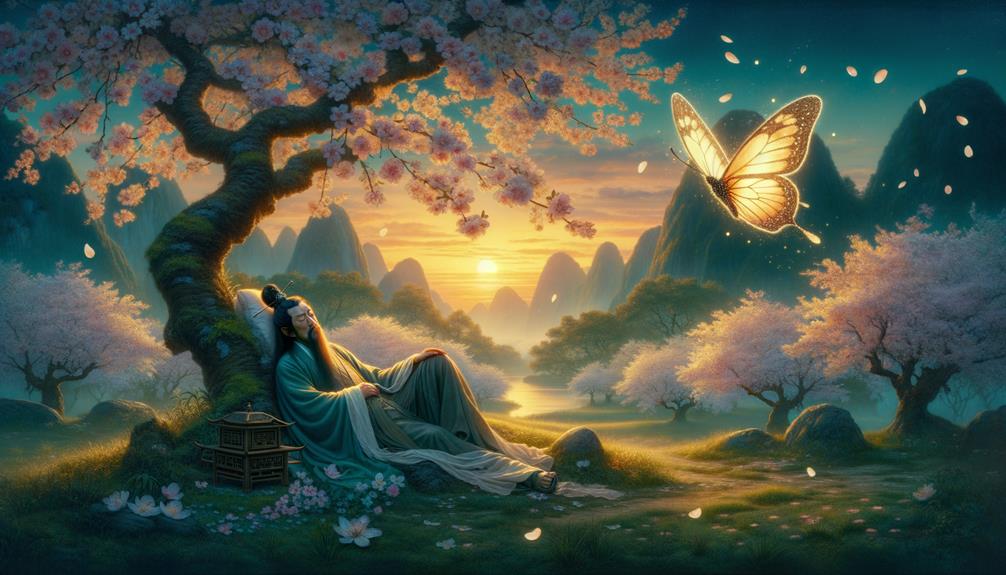Zhuangzi awakens from a dreamscape where he transformed into a delicate butterfly, soaring freely through the night sky. A profound quandary emerges: was he truly Zhuangzi envisioning himself as a butterfly, or is he now a butterfly dreaming of the existence of Zhuangzi? This metamorphosis blurs the lines between reality and illusion, prompting deeper contemplation of consciousness and identity. Immersing oneself in Zhuangzi’s tale unveils profound wisdom, challenging our understanding of the self and the surrounding world. Venture forth, and the profound significance of this dream will unfurl before you.
The Story of Zhuangzi
In ancient China, the sage Zhuangzi embarked on a profound inner journey, experiencing a vivid dream where he transformed into a butterfly. This strange occurrence challenged his perception of reality and sense of self. Zhuangzi found himself fluttering gracefully with delicate wings, feeling as though he had always been this beautiful creature.
Through the butterfly’s eyes, Zhuangzi witnessed the world anew, liberated from human constraints. The dream felt incredibly lifelike, leading him to question upon waking whether he was Zhuangzi dreaming of being a butterfly or a butterfly dreaming of being Zhuangzi. This poignant moment transcended a mere return to wakefulness; it was a confrontation with the fundamental nature of existence itself.
Zhuangzi’s butterfly symbolizes life’s fluid and illusory nature. Just as a butterfly undergoes metamorphosis, his journey depicts the blurred boundaries between states of being. The allegory invites contemplation on the gossamer veil separating dreams from reality and the true essence of our identities. Zhuangzi’s teachings challenge us to perceive beyond conventional limitations, unveiling deeper truths about our existence.
Philosophical Interpretations
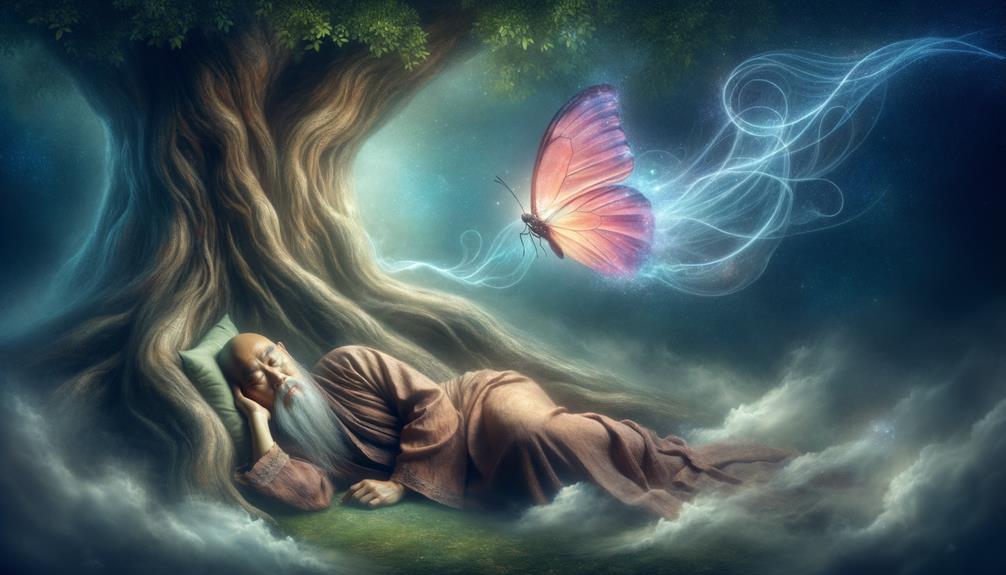
Zhuangzi’s butterfly dream invites us on a thought-provoking journey where reality and identity blend together. When Zhuangzi questioned whether he was a man dreaming of being a butterfly or a butterfly dreaming of being a man, it challenged our understanding of existence.
This tale symbolizes the fluidity of identity and how our reality might be an illusion. The dream unveils a doorway, encouraging us to scrutinize our waking lives. Are we, like Zhuangzi, mere dreamers in a grand cosmic mirage?
Philosophers have extensively analyzed this dream’s implications. Some view it as a celebration of freedom from societal constraints, while others see it as a disquieting reminder of reality’s uncertainty. Regardless of whether we interpret Zhuangzi’s butterfly as an emblem of liberation or existential ambiguity, the tale compels us to explore consciousness and transformation.
Through Zhuangzi’s dreaming, we embark on a timeless quest, navigating the intricate interplay between illusion and enlightenment.
Identity and Reality
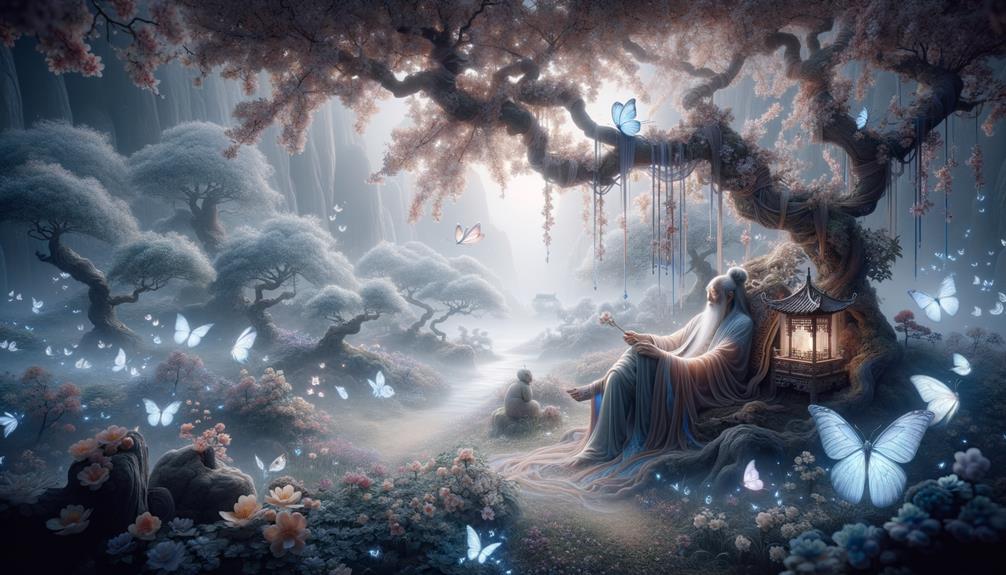
The intriguing relationship between identity and reality invites us on a journey of self-exploration, where the lines between who we are and what we perceive blur into a cosmic tapestry. Zhuangzi’s dream of becoming a butterfly propels us into this very odyssey. In the serene realm of a dream, the sage Zhuangzi metamorphoses into a butterfly, fluttering freely. Yet upon awakening, he faces an existential puzzle: was he Zhuangzi dreaming of being a butterfly, or a butterfly dreaming of being Zhuangzi?
This tale transcends mere storytelling, evoking profound queries about self-awareness and the nature of reality. Zhuangzi’s transformation illustrates the fluidity of identity and the elusive essence of truth. We find ourselves questioning the solidity of our own perceptions and the certainty of our knowledge.
| Zhuangzi as Human | Zhuangzi as Butterfly |
|---|---|
| Conscious Thought | Instinctual Existence |
| Human Identity | Butterfly Identity |
| Perception of Reality | Dreamlike State |
| Earthbound | Airborne Freedom |
| Truth Seeker | Embodiment of Mystery |
This allegory compels us to reflect on consciousness and perception, urging us to embrace the mysterious and ever-changing nature of our existence. The butterfly dream becomes a mirror, challenging our understanding of identity and reality, and inviting us to explore the depths of our own being.
Dream Vs. Wakefulness
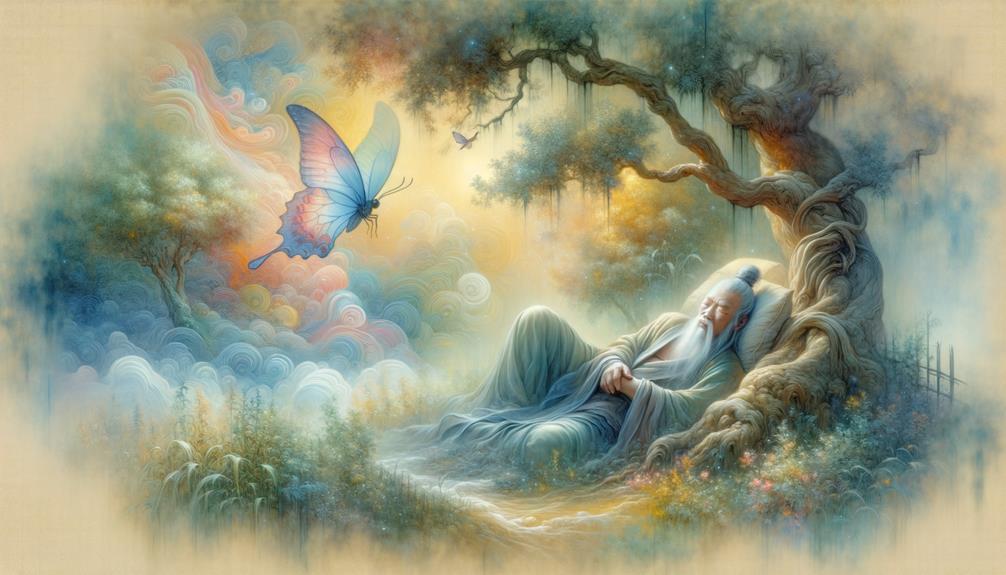
Zhuangzi’s transformation into a butterfly sparks questions about reality’s essence and my identity within it. Am I the dreamer or the dreamed, awakening to a world where perception and truth intertwine? This journey compels me to confront existence’s fluidity, where change reigns and wakefulness’s boundaries dissolve.
Perception of Reality
My search for life’s meaning has me reflecting on Zhuangzi’s renowned parable of dreaming he was a butterfly. Was he a man dreaming of being a carefree creature or vice versa? I can’t shake the uncertainty surrounding consciousness.
The dream realm and reality seem inseparable, each mirroring the other endlessly. Children often grasp this fluidity better than adults, seeing existence through unassuming eyes. Zhuangzi’s story reminds me to question the nature of wakefulness.
Unpacking the symbolism feels like a journey of self-discovery. I’m compelled to unravel the profound interplay between dreams and reality before me. Zhuangzi prompts deep ponderings many philosophers, like Descartes, also grappled with.
Identity and Transformation
Stepping into Zhuangzi’s dreamscape, I teeter on the precipice of identity and change, questioning the very fabric of my wakeful existence. As Chuang Tzu transforms into a butterfly, the boundaries between dream and reality blur. I find myself pondering: Am I the dreamer, or the dreamt? This surreal journey challenges conventional self-awareness, pulling me into a realm where existence and illusion merge.
In this mythic tale, Zhuangzi’s butterfly dream becomes a profound metaphor, illustrating the fluid nature of identity and perception. The metamorphosis from man to butterfly and back symbolizes the ever-shifting nature of our consciousness. It’s not just a physical transformation but a deeper, spiritual shift that dreams can spark within us.
Chuang Tzu’s experience invites us to explore the transformative potential of dreams. They shape our understanding of reality and, in doing so, redefine who we are. By embracing the dream’s fluidity, I uncover new depths of self-awareness, realizing that both wakefulness and dreaming are two sides of the same coin, each with the power to transform our sense of identity.
Influence on Modern Thought
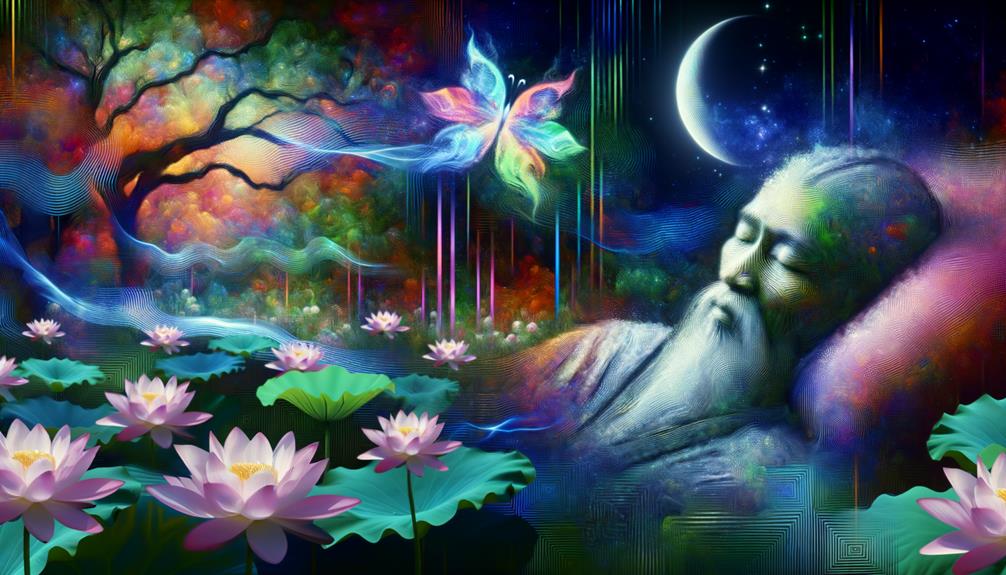
Zhuangzi’s butterfly dream resonates across centuries, prompting an eternal quest to comprehend reality and decipher our enigmatic identities. When Zhuang Zhou awakened from his reverie, he embarked on a journey of self-discovery, grappling with a profound question: was he Zhuang Zhou dreaming of being a butterfly, or a butterfly dreaming of being Zhuang Zhou? This ancient parable defies temporal boundaries, striking a chord with modern thought, compelling us to explore the depths of existence.
In our era, Zhuangzi’s butterfly dream echoes through philosophical discussions, challenging us to contemplate identity’s malleability and consciousness’s nature. Modern thinkers reference Zhuangzi’s transformative vision to dissect subjective experience’s intricacies and knowledge’s limitations. His dream becomes an archetypal symbol, representing thought’s metamorphosis and the pursuit of self-awareness.
The dream’s influence reverberates through metaphysics and epistemology, urging us to reevaluate the distinctions between illusion and reality. It beckons the mind on an adventure, guiding us through perception’s labyrinth to uncover the truths woven within our dreams and waking lives.
Reflections on Perception
Now, this might only be my opinion, but pondering Zhuangzi’s butterfly dream forces me to confront the blurred line between reality and illusion. This symbolic tale pushes me to question my consciousness and the subjective lens through which I view the world. Am I the dreamer, or the dreamed?
Reality Versus Illusion
In the stillness of night, I had a strange dream about a butterfly. For a fleeting moment, the line separating reality from fantasy faded, opening a world of endless possibilities. Like the ancient Chinese philosopher Zhuangzi, I found myself wondering – was I a person dreaming of a butterfly, or a butterfly dreaming of being human? This encounter with the mythical insect invites us to ponder the complex relationship between what’s real and what might be an illusion.
Zhuangzi’s dream sparks deep questions about the nature of our existence and perceptions, not unlike Descartes pondering the existence of self. His seemingly whimsical tale conceals profound insights about transformation and ambiguity in human consciousness. The butterfly symbolizes metamorphosis, a recurring theme in Chinese literature and philosophy, reminding us that our perceived reality might just be one facade of a complex, multilayered existence.
With each fluttering of its delicate wings, the butterfly beckons us to contemplate the fluidity of our perceptions. In different contexts, what we assumed to be solid ground could reveal itself as yet another illusion. Zhuangzi’s dream propels us on an odyssey, challenging our fundamental understanding of reality itself.
Subjective Experience Matters
How often do we pause and ask ourselves if what we’re experiencing is real or merely a projection of our minds? Zhuangzi’s butterfly dream encourages us to ponder the depths of our subjective experiences. It challenges us to venture beyond our everyday routines and contemplate the very fabric of the reality we perceive. On this journey, we become explorers navigating the maze of perception, with each turn unveiling fresh perspectives on our existence.
Zhuangzi’s dream invites us to reflect inwardly on how our senses and thoughts shape our reality. It reminds us that what appears solid and real can be as transient as a dream.
Our perceptions are fluid – our senses can mislead us, blurring the lines between reality and illusion. Our identity is malleable – just as Zhuangzi questioned if he was a man or a butterfly, we must ponder the ever-changing nature of our own identities. Reality itself is subjective – each person experiences the world uniquely, influenced by their thoughts and emotions. These moments of introspection lead us to profound questions about the nature of existence.
Ultimately, Zhuangzi’s dream teaches us that subjective experience is the lens through which we view the world, shaping our understanding and charting our life’s course.
Nature of Consciousness
Why do we so often overlook the profound mystery of our own consciousness? In our busy lives, we rarely pause to ponder the enigma of awareness itself. Zhuangzi’s butterfly dream tale invites us to question reality and perception. When Zhuangzi dreamt he was a butterfly, he awoke unsure if he was Zhuangzi dreaming of being a butterfly or a butterfly dreaming of being Zhuangzi.
This paradox challenges our identity and consciousness’s essence. Are we the dreamers or the dreamt? Reflecting on Zhuangzi’s dream, I contemplate perception’s fluidity. Our senses and thoughts shape subjective realities – mosaics of fleeting moments and shifting perspectives. This philosophical metaphor urges exploration of our understanding’s limits and self-awareness’s boundless nature. Unraveling these mysteries brings us closer to perceiving and existing’s true meaning.
Frequently Asked Questions
What Is the Chinese Story About the Dream of a Butterfly?
I had this dream where I was a butterfly, flitting around without a care in the world. When I woke up, I couldn’t help but wonder – was I Zhuangzi dreaming of being a butterfly, or a butterfly dreaming of being Zhuangzi? The story makes you question the line between what’s real and what’s mere illusion.
What Does Butterfly Symbolize in Dreams?
Butterflies fluttering through dreams symbolize profound personal transition – think of the metamorphosis from caterpillar to winged beauty. These dream insects represent embracing life changes that allow our authentic selves to emerge. Their ephemeral grace reminds us that growth often means releasing what is familiar to experience newfound freedom. When butterflies appear in the unconscious mind, view them as guides encouraging you to spread your wings.
What Is the Dreaming Butterfly Paradox?
The dreaming butterfly paradox sets me questioning: Am I the hero visualizing being a butterfly, or the butterfly imagining being the hero? It challenges how I perceive reality, my identity, and the very nature of my existence.
What Is the Chinese Proverb About Butterflies?
I embarked on a captivating journey to uncover a profound Chinese proverb about butterflies. This proverb hints at a deep metamorphosis, blurring the boundaries between reality and illusion. It urges us to contemplate whether life itself is a transient vision.

